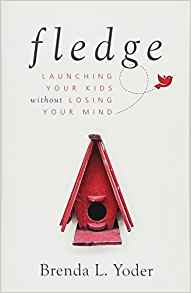 This is the time of year our children begin settling back into school and some of us launch our kids into the bigger world of college or an independent endeavor that does not include us. If you are part of the latter category, Brenda L. Yoder’s new book, Launching Your Kids Without Losing Your Mind can bring you tremendous insight and encouragement for how to integrate this new phase of life into your parenting and marriage.
This is the time of year our children begin settling back into school and some of us launch our kids into the bigger world of college or an independent endeavor that does not include us. If you are part of the latter category, Brenda L. Yoder’s new book, Launching Your Kids Without Losing Your Mind can bring you tremendous insight and encouragement for how to integrate this new phase of life into your parenting and marriage.
Brenda is a Licensed Mental Health Counselor, Life Coach, former award winning teacher, and mom of four children ranging in age from teens to adults. Her passion is to encourage others when life doesn’t meet the storybook image.
In this interview, I’m pleased to introduce you to Brenda and her helpful and authentic perspective on this challenging period of a parent’s life.
Linda: What inspired you to write Fledge: Launching Your Kids Without Losing Your Mind?
Brenda: Herald Press approached me about writing a parenting book for them and I knew right away that I wanted to write something about the stage of life I was in–releasing kids but also still raising some. While there were resources for parenting teens and young adults, there were absolutely no resources about parenting both at the same time and the changing family and hormones that occur when you’re releasing kids but don’t have an empty nest.
Linda: As moms we sometimes feel like we’re the only ones who struggle when kids grow up. How has the process of writing and releasing Fledge: Launching Your Kids Without Losing Your Mind reinforced that we’re not alone?
Brenda: When I first pitched the idea to the publishers, those who had gone through this stage already affirmed the need for such a resource. Before I wrote Fledge, I wrote a blogpost called “I Have No Friends and Other Mom Grief” and was overwhelmed at the number of women who identified with this common experience of loss. Since writing Fledge, I’ve heard from woman after woman who connect with the idea of the book without even reading it. Early reviewers have shared how meaningful the content has been. I truly wrote the book so other moms wouldn’t feel so weird, vulnerable, and alone in this season, because it’s how I felt. I honestly need other moms to commiserate with!
Linda: What’s one piece of advice you’d give to a mom who’s ready to start the fledging process or is in the middle of it?
Brenda: Give yourself grace. Give yourself grace when you feel like you’re losing everything you thought you knew about life. Give yourself grace when you are emotional at the “lasts” you experience with each child. Give yourself grace when you don’t feel like rejoicing or being stoic at the milestones which should be celebrated. Give yourself grace when your husband doesn’t understand that you miss your kids. Give yourself grace when your kids call you weird because you cry. Give yourself grace when you look in the mirror and see your mom. Give yourself grace when your birthday numbers say you’re “old.” In all your experiences as a midlife, fledging mom, give yourself grace. (There’s a chapter just on this).
Linda: There may be a mom or dad who realize they made a lot of mistakes releasing their kids. What can they do after the fact if they feel like they did it all wrong?
Brenda: Thankfully, Christian parents have hope that God can undo our mistakes in His time. I know this from personal experience. Joel 2 promises God will redeem the years the locusts have eaten; but the redemption comes after confession and repentance. While parents can’t undo past mistakes, we can confess mistakes or sins against our children. We can ask for forgiveness from those we’ve offended. We can change behavior that needs to be changed and accept responsibility for natural consequences. This also includes holding older teens, young adult, and adult children responsible for their own behavior and not taking on parent shame or blame for another’s unhealthy or harmful behavior. It’s humbling when you realize the effect your mistakes or sins have had on your child, but it doesn’t excuse their unhealthy or unsafe choices as an adult. Like other regrets, deal with what needs to be dealt with, give it to God, and move forward. We have to let our adult children walk their own journey and come around on their own time.
Linda: How have you seen God use your transparency and vulnerability?
Brenda: I started writing my blog, Life Beyond the Picket Fence, with vulnerability and transparency because it was what I needed at the time as a struggling mom. I needed people to be real with me. That transparency and vulnerability is what connected and has continued to connect with others when I speak and or write. When I receive emails, cards, or comments from others saying how my words have shown them they’re not alone, and that my words express how they feel, I know I’m doing what I should be doing. When I was a struggling parent and felt alone, I looked around and only saw people whose lives were perfect. I needed someone to be real with me who also had a strong faith amid life’s struggles. I’ve made a commitment to be the type of woman I needed when I felt alone.
Linda: Raising kids can be hard on a marriage, especially as spouses approach the nest emptying. How does Fledge address marriage as kids grow up and leave?
Brenda: Parenting can be hard on a marriage. Healthy marriages naturally struggle when kids grow up and begin to leave. But parenting teens, toxic teens or young adults, or kids with emotional or behavioral needs take a toll on family members and marriages. Fledge was written to address a lot of these problems that can hijack and destroy a marriage—problems such as enabling, enmeshment, lack of boundaries, and codependency. It’s tempting for one spouse to become entrenched while parenting kids or young adults who are not healthy. Fledge helps parents know how to handle many of these difficult problems that happen during the parenting and releasing years while trying to keep the family and marriage intact. On the other hand, a toxic marriage can greatly impact a family, too. Sometimes a woman, especially, needs to know how to set boundaries not only with her children but also with a toxic or abusive husband, and vice versa. As a counselor, I try to cover the hard areas of both parenting and marriage in Fledge so kids and parents can each be the healthiest they can when kids go out on their own.
Linda: Most of us are familiar with the terms boundaries, codependency and enabling, but please tell me more about the term enmeshment. What does this mean, and how do we identify it?”
Brenda: Enmeshment is when there are a lack of boundaries and autonomy between people, primarily parents and children. As children become adults, they are supposed to separate from mom and dad and have their own independent thoughts, feelings, actions, and life. You can identify enmeshment when, as a parent, you want to control your child’s life, even in the simplest form, once they are adults. Do you consider your child your greatest confidant or friend, even above friends the age of your peer? Do you feel jealous or sad when your adult or teen child chooses to do things with friends or their spouse over you? These are all indicators of enmeshment.
As parents, we are to let our kids be autonomous with their spouse and peers, it’s part of letting go.
Linda: “How can enabling, enmeshment, lack of boundaries, and codependency affect a marriage?”
Brenda: God calls us to leave and cleave to our spouse. Enabling, enmeshment, codependency and a lack of boundaries strains the marriage relationship in multiple forms. Instead of pulling back to the original relationship, the husband and wife relationship, after kids leave, these behaviors take the place of affection, attention, energy, and honor we should be giving to our spouse. When we don’t have boundaries with our adult kids, we dishonor the primary relationship with our spouse and also prevent our kids from starting their own lives. Resentment, disconnection, disengagement can settle into a marriage when one spouse has these unhealthy patterns with an adult child. These patterns also create an overall unhealthy family system that a partner may choose to permanently disengage from through divorce.
Linda: If parents are in the middle of a crisis in their marriage, how can they keep their own problems from having a negative impact on their children?
Brenda:
- Refrain from talking about the spouse negatively in front of the kids.
- Refrain from arguing or talking about these things in front of the kids.
- Seek counseling.
- Be honest with kids about the crisis, but do it with only appropriate information they need to know.
- Seek counseling for the kids.
- Help the kids to have as much of a normal life as possible in the middle of the crisis and afterward.
- Be as healthy as you can be as a parent in the midst of the crisis. Seek help and support for the family.
- Depending on the type of crisis, seek family counseling.
Linda: Where can readers find out more about you, your book, and your ministry?
Brenda: For more on letting go and everything else in the fledging stage of parenting, you can find Fledge: Launching Your Kids Without Losing Your Mind at online and major retailers. Join me on Facebook for our upcoming Fledge Parenting Forum, and on Instagram, Twitter, and at the Life Beyond the Picket Fence blog at brendayoder.com




